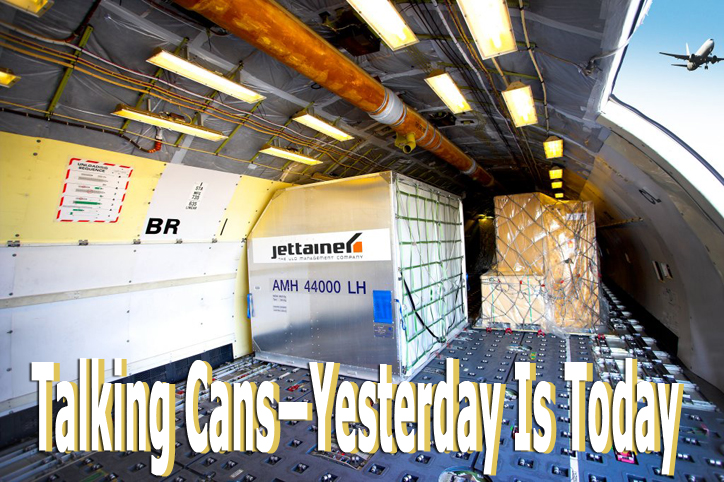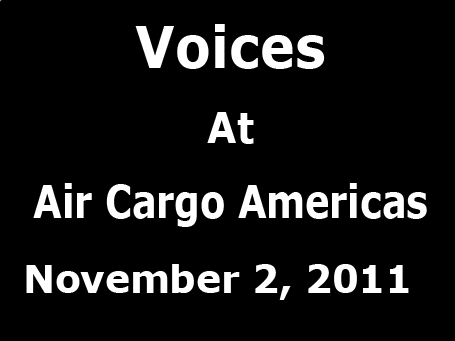Asset
Management Of Cargo Containers & Pallets
 It’s
interesting to see how certain developments look when put into perspective
through the passage of time. The particular timeline is 1996 and former
Qantas cargo chief (Executive Director) Emmet Hobbs, a New Zealander,
was working for CHEP, a Brambles company (he retired in 2003), but
is still active serving on BOD with Mainfreight New Zealand. It’s
interesting to see how certain developments look when put into perspective
through the passage of time. The particular timeline is 1996 and former
Qantas cargo chief (Executive Director) Emmet Hobbs, a New Zealander,
was working for CHEP, a Brambles company (he retired in 2003), but
is still active serving on BOD with Mainfreight New Zealand.
With the asset management pedigree of
Brambles and CHEP and Emmet’s air cargo experience, he embarked
on a quest to educate and ultimately convince airlines to sign up
for what has been known as “ULD pooling & management.”
Knowing the ropes from his time as a
member of the IATA Cargo Committee, Emmet lobbied the cargo executives
at various events and occasions. I vividly recall a meeting IATA arranged
at Emmet’s behest as a moderator for such a meeting in Los Angeles,
CA at one of the airport hotels.
A charismatic personality, he did a
great job presenting the concept of what CHEP proposed, using the
analogy of the wooden pallets the company managed worldwide to illustrate
how pooling worked.
It was a compelling case and yet the
degree of skepticism permeating the conference room was as palpable
as one’s pulse.
It must be the fate of the ground breakers
to be ahead of their times; the idea that a carrier would turn over
its entire ULD inventory to a third party that would manage it professionally
for them was beyond anything those present for that meeting 15 years
ago could imagine.
The other factor was that those airlines
were mostly major carriers with tens of thousands of units each and
the risk of experimenting with these assets was too daunting.
Nothing happened until Swissair founded
Globepool in 1999 to provide ULD pooling and management services to
its erstwhile Qualiflyer alliance member airlines.
Several of those carriers were midsize
airlines that allowed for a gradual rollout.
Before it could fully mature though,
in late 2001 Swissair’s parent SAirGroup went bankrupt.
The Globepool business was acquired
in a management buyout led by Philip Hill and Jorgen Veslov, renamed
Unitpool, and eventually landed Swissport as a majority owner in 2003.
Fast forward to 2010 and indeed what
goes around comes around—Brambles acquired Unipool and one year
later, it also acquired JMI Aerospace, a New Zealand company specializing
in the maintenance and repair of equipment such as galleys, carts
and ULDs as well as related software solutions.
 Unitpool
CEO David Harman (left) and JMI CEO James Everett attended last month’s
IULDUG annual general meeting. Together they manage an inventory of
about 42,000 ULDs. Unitpool customer airlines include Air Transat,
Gulf Air, Kenya Airways, AirBridgeCargo, Cargolux, Polet Airlines,
World Airways and most recently SAS. JMI serves Qantas, Air New Zealand,
Virgin Australia and Jetstar. Unitpool
CEO David Harman (left) and JMI CEO James Everett attended last month’s
IULDUG annual general meeting. Together they manage an inventory of
about 42,000 ULDs. Unitpool customer airlines include Air Transat,
Gulf Air, Kenya Airways, AirBridgeCargo, Cargolux, Polet Airlines,
World Airways and most recently SAS. JMI serves Qantas, Air New Zealand,
Virgin Australia and Jetstar.
What would the world be without competition?
Jettainer, the only other pooling and management company, was the
result of Lufthansa and Trencor’s TrenStar getting together.
TrenStar, originally a South African company which provides asset
management solutions and US tracking solutions business in Denver,
Colorado, has since been acquired by Fluensee, another Denver-headquartered
asset management solution provider. It held a 33 percent interest
in Jettainer.
The heavy duty Lufthansa ownership and
apparent strategic approach has resulted in Jettainer, in addition
to Lufthansa, securing several major Star Alliance member airlines
including Air Canada, Swiss, United and US Airways.
 The
pool Jettainer manages has about 80,000 units. Director of Operations
Andreas Seitz participated in the IULDUG meeting in Miami and Alexander
Plümacher (right) has been Managing Director for a good number
of years. The
pool Jettainer manages has about 80,000 units. Director of Operations
Andreas Seitz participated in the IULDUG meeting in Miami and Alexander
Plümacher (right) has been Managing Director for a good number
of years.
In principle, the model the pooling
companies offer includes taking on full responsibility for a carrier’s
ULDs, ensuring each station in that airline’s network has the
set number and type of units agreed, repair of ULDs and the provision
of new units, all of which is essentially for a per unit/per month
price.
This offering removes the unpredictable
fluctuations in capital expenditures for a carrier that typically
result from needing to maintain a larger inventory than would be required
were it being managed by a pooling company, together with the unavailability
of units in repair and the costs associated with repairs and replacement.
The only real surprise is that after
ten or so years in service, more airlines have not availed themselves
of pooling management. With the sole exception of some Star Alliance
airlines, none of the other alliances seem to have recognized that
pooling is a natural avenue for a group of airlines that are otherwise
coordinating schedules, handling and other services and generally
looking for synergy and savings.
It may all come down to the “curse
of the ULD” – it remains one of those things that paradoxically,
while undisputedly essential, does not rise to the level, nor command
a significant enough attention-grabber for the executives—unless
units are not available for a flight, be it for loading passenger
baggage on wide body aircraft or cargo.
It is encouraging that since the concept
was first promoted in 1996, in the course of the next 15 years, forty
or so airlines rely on pooling – business as usual, but it’s
definitely an extremely long courtship.
Ted
|




